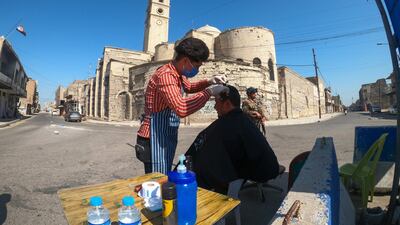Iraqi authorities lifted business and work bans imposed last month to counter the coronavirus despite new cases in the country’s oil centre of Basra that showed an ongoing spread of the pandemic.
All businesses and factories, except restaurants, can re-open as long as they “commit to apply health prevention and no-gathering measures”, the government said late on Sunday.
The public sector will reopen, using a quarter of its 7 million employees. Taxis and heavy trucks can be back on the road, although schools and universities remain closed, and a curfew will extend through Ramadan.
The restrictions were lifted after a night meeting headed by caretaker prime minister Adel Abdul Mahdi, which also decided to make wearing masks mandatory in public.
The central government has repeatedly dismissed criticism by provincial administrators of failing to deal with the economic damage from the pandemic and to stop flows of infected people from Syria and Iran.
Basra governor Assad Aidani told official media infections in the province rose the last few days due to the governorate’s “proximity to Iran and closeness to the sea”, as well as the presence of foreign oil companies.
The Health Ministry said on Sunday that it had sent a rapid response team to Basra after discovering an undisclosed number of suspected infections in the district of Al Qurna.
But the ministry said it recorded 17 coronavirus cases in Basra out of a total of the 26 new cases in the country in the last 24 hours. Al Qurna is home to one of Iraq’s largest oil fields, operated by Russian company Lukoil.
The government announced the country’s first coronavirus case in the last week of February, a month after the virus was first reported in the Middle East. Curfew measures have been widely ignored, officials and witnesses say.
The crisis has intensified power struggles in the Iraqi political system but maintained the public profile of Mr Abdul Mahdi. Street demonstrations that the authorities eventually crushed forced his resignation last year but two nominees have so far failed to form a cabinet to take his place.
Calls by Ayatollah Ali Sistani, Iraq’s highest Shiite authority and one of the few independent public figures in the country, to adhere to the coronavirus containment measures, were ignored by Moqtada Al Sadr, a relative upstart who spends some of his time living in Iran.
Officially 1,530 people in Iraq have been infected with the coronavirus, and 82 of them died.


